MercoPress. South Atlantic News Agency
Tag: Inflation
-
Saturday, November 28th 2020 - 08:52 UTC
Producer inflation in Brazil rose 3,4% in October and 19,1% in twelve months
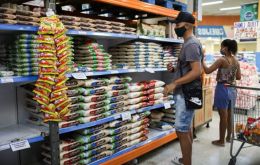
Producer price inflation in Brazil jumped to its highest on record in October, figures showed on Thursday, led by another month of rising food prices, which will likely stir the debate further on the wider outlook for inflation and interest rates.
-
Saturday, November 7th 2020 - 08:06 UTC
Food and transport costs lifting annual inflation in Brazil to the central bank year target
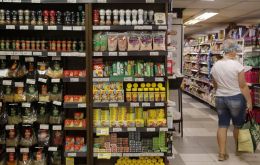
Brazilian inflation in October rose to its highest level for that month since 2002, figures showed on Friday, driven by rising food and transport costs and lifting annual inflation to within sight of the central bank’s year-end target.
-
Friday, November 6th 2020 - 08:53 UTC
Brazil's spike in inflation is 'temporary', central bank president Campos Neto
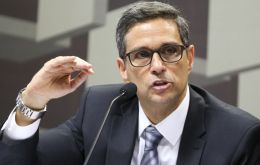
Brazil’s recent spike in inflation is temporary, central bank President Roberto Campos Neto said, adding, however, that policymakers are monitoring developments closely.
-
Friday, October 30th 2020 - 09:37 UTC
Brazil keeps interest rate at record low, despite a spike in food and fuel inflation

Brazil’s central bank kept its key interest rate at a record-low 2.00% on Wednesday, maintaining its “forward guidance” pledge to keep rates lower for longer and even the possibility of further easing, despite the recent rise in inflation and fiscal risks.
-
Monday, September 28th 2020 - 09:31 UTC
It’s time to dump Argentina’s Peso
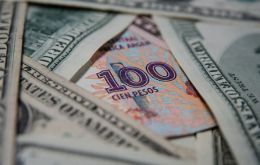
By Steve H. Hanke – In addition to facing an acute Covid-19 crisis, Argentina's deadbeat economy is collapsing, and, as usual, the inflation noose is around Argentines’ necks. Argentina’s official inflation rate for August 2020 is 40.70% per year. And, for once, Argentina’s official rate is fairly close to the rate that I calculate each day using high-frequency data and purchasing power parity theory, a methodology that has long proved its worth when compared with official statistics. Today, I measure Argentina’s annual inflation rate at 37%, but probably not for long — the noose is generally followed by the trapdoor.
-
Thursday, September 17th 2020 - 09:30 UTC
Argentina tightens currency controls, helping the US dollar climb to a new record
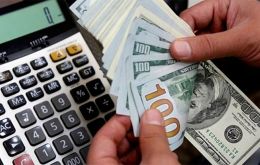
Argentina's peso currency plunged further into record low territory after the central bank tightened currency controls. The peso opened almost 0.1% weaker at 75.25 per U.S. dollar, traders said, and the country risk rose 38 basis points to 1,157. The black market peso or blue dollar plummeted 9.7% to open at a new all-time low 145 per U.S. dollar.
-
Thursday, September 17th 2020 - 09:29 UTC
Brazil keeps key interest rate at record low 2%; anticipates “forward guidance” instead of further cuts
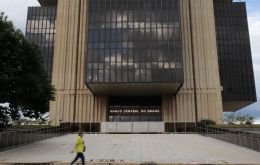
Brazil’s central bank kept its key interest rate at a record-low 2.00% on Wednesday, pledging to stimulate the coronavirus-hit economy with “forward guidance” rather than more rate cuts because of the risk to financial market stability that they could pose.
-
Monday, September 14th 2020 - 11:19 UTC
China's impact on poor Brazilians: prices of staples skyrocket, black beans 30%, rice 20%

Black beans are up nearly 30%, beef about 40% – Brazilians are facing a skyrocketing rise in food prices, caused by record exports to China and strong domestic demand. This rebound, amid the economic and social crisis caused by the new coronavirus pandemic, has led the president, Jair Bolsonaro, to ask the owners of supermarkets to show “patriotism” and “keep their profit margin as low as possible”.
-
Saturday, August 22nd 2020 - 09:40 UTC
Venezuela, Argentina and Colombia among the highest rates in Bloomberg's Misery Index
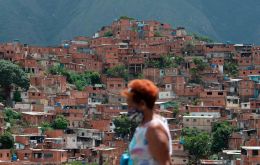
Bloomberg’s Misery Index, which tallies inflation and unemployment outlooks for 60 economies shows that almost all of the economies surveyed are projected to be more miserable this year amid Covid-19, with analysts expecting increased joblessness and tepid growth.
-
Friday, August 14th 2020 - 09:38 UTC
Argentina inflation in July was 1,9% and the 12-month rate 42,4%

Argentina's July inflation rate was 1.9%, the government's Indec statistics agency reported on Thursday, bringing the seven-month rate to 15,8% and the 12-month rate to 42.4%. During July the items which showed the main increase were Housing maintenance, 3,9% and Leisure and Culture, 3,3%, with a special emphasis in electronics and home appliances.
